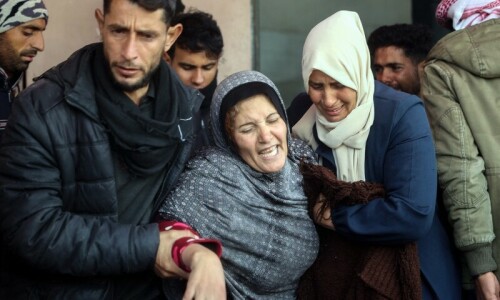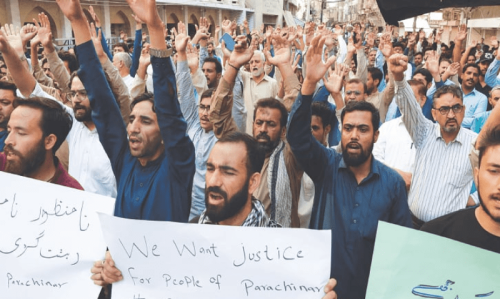CAIRO: Egypt Sunday announced early presidential elections likely to anoint the general who overthrew president Mohamed Morsi, as the country reeled from a weekend of violence that killed dozens of people.
Interim president Adly Mansour announced the poll in a televised address, a day after 49 people died in clashes between Islamist protesters and police and thousands rallied in Cairo in support of military chief General Abdel Fattah al-Sisi.
Sisi was expected to declare his candidacy for the election, scheduled before mid-April, after a show of support including Saturday's large rally in Cairo's Tahrir Square.
But the weekend clashes and bombings also highlighted the interim government's precarious grip seven months after Morsi's overthrow.
The violence came as Egypt commemorated the 2011 uprising that overthrew veteran strongman Hosni Mubarak, leading to three years of tumult that many hope Sisi's election will end.
Over Friday and Saturday, six bombs exploded in Cairo and the canal city of Suez, killing six people and wounding dozens in an escalation of a militant campaign Mansour has pledged to eradicate.
Separately, 49 people were killed in clashes when police clamped down on protests by Morsi's Islamist supporters and anti-military activists, the health ministry said.
As Mansour addressed the nation to announce the early presidential election, relatives of those killed on Saturday assembled outside a Cairo morgue, chanting anti-military slogans.
“Down with the military! The people want to topple the regime!” they chanted outside the Zeinhom morgue as they collected the corpses of loved ones.
A statement signed by nine Egyptian human rights groups accused the police of using “live ammunition” against demonstrators. Police said the protesters themselves had used weapons.
Police in the capital bolstered defences outside their buildings and closed access roads after the weekend bombings that all targeted police facilities.
In his address, Mansour, a judge the military appointed as interim president to replace Morsi, pledged to “uproot (terrorists) and show them no mercy”.
The government says a series of polls that started with a constitutional referendum in January and will end in parliamentary elections will restore an elected government by 2015.
A parliamentary election had been scheduled ahead of the presidential poll, but Mansour said on Sunday he had revised the timetable following many demands.
A presidential election first may allow Sisi, if he stands, to influence the outcome of parliamentary elections by forming a party that would attract leading candidates.
But Sisi, accused by Morsi supporters of carrying out a coup ending the Islamist's single year in power, still faces a determined opposition and a semi-insurgency.
Hours before Mansour spoke, militants ambushed a bus carrying soldiers in the restive Sinai Peninsula, killing four troops.
And an Al-Qaeda-inspired group in the peninsula claimed it had shot down a military helicopter on Saturday, in what the army said was an “accident” that killed five soldiers.
The group, Ansar Beit al-Maqdis, had earlier claimed responsibility for the bombings in the capital.
Security stepped up
The attacks, starting with a car bomb that killed four people outside Cairo police headquarters on Friday morning, underscored the resilience of the Sinai-based militants who had tried to assassinate the police chief in September.
Police sealed off several main squares in Cairo on Sunday and used metal barriers to block roads leading to police stations.
In December, a car bombing outside a police building north of Cairo killed 15 people, prompting the interim government to blacklist Morsi's Muslim Brotherhood movement as a terrorist group.
That bombing was also claimed by Ansar Beit al-Maqdis.
The Brotherhood's blacklisting, despite its condemnation of the attack, was seen as an extension of a crackdown on Morsi supporters that has killed more than a thousand people and jailed thousands more.
Police said they arrested at least 1,000 protesters on Saturday alone.
The government and the military now rule out dealing with the Brotherhood, which had won every election following Mubarak's overthrow in the 2011 popular uprising.
The government says the group, which renounced violence decades ago in favour of electoral politics, is linked to the militant attacks, and Morsi himself is facing trial on terrorism-related charges.
Morsi's followers insist that he be reinstated, and have called for further protests in the days ahead.














































Dear visitor, the comments section is undergoing an overhaul and will return soon.